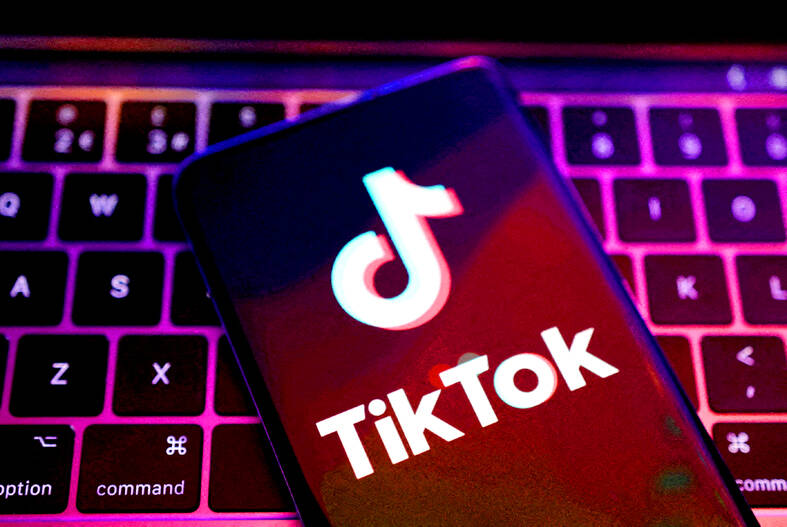Pakistani police yesterday said a father shot dead his daughter after she refused to delete her TikTok account. In the Muslim-majority country, women can be subjected to violence by family members for not following strict rules on how to behave in public, including in online spaces.
“The girl’s father had asked her to delete her TikTok account. On refusal, he killed her,” a police spokesperson said.
Investigators said the father killed his 16-year-old daughter on Tuesday “for honor,” the police report said.

Photo: Reuters
The man was subsequently arrested.
The girl’s family initially tried to “portray the murder as a suicide” said police in Rawalpindi, where the attack happened. Last month, a 17-year-old female TikTok influencer with hundreds of thousands of online followers was killed at home by a man whose advances she had refused.
Sana Yousaf had racked up more than a million followers on social media accounts, including TikTok, where she shared videos of her favourite cafes, skincare products and traditional outfits.
TikTok is wildly popular in Pakistan, in part because of its accessibility to a population with low literacy levels. Women have found audience and income on the app, which is rare in a country where fewer than a quarter of the women participate in the formal economy.
However, only 30 percent of women in Pakistan own a smartphone, compared with twice as many men (58 percent), the largest gap in the world, the Mobile Gender Gap Report 2025 showed.
Pakistani telecommunications authorities have repeatedly blocked or threatened to block the app over what it calls “immoral behavior,” amid backlash against LGBTQ and sexual content.
In southwestern Balochistan, where tribal law governs many rural areas, a man confessed to orchestrating the murder of his 14-year-old daughter earlier this year over TikTok videos that he said compromised her “honor.”

POLITICAL PATRIARCHS: Recent clashes between Thailand and Cambodia are driven by an escalating feud between rival political families, analysts say The dispute over Thailand and Cambodia’s contested border, which dates back more than a century to disagreements over colonial-era maps, has broken into conflict before. However, the most recent clashes, which erupted on Thursday, have been fueled by another factor: a bitter feud between two powerful political patriarchs. Cambodian Senate President and former prime minister Hun Sen, 72, and former Thai prime minister Thaksin Shinawatra, 76, were once such close friends that they reportedly called one another brothers. Hun Sen has, over the years, supported Thaksin’s family during their long-running power struggle with Thailand’s military. Thaksin and his sister Yingluck stayed

In the sweltering streets of Jakarta, buskers carry towering, hollow puppets and pass around a bucket for donations. Now, they fear becoming outlaws. City authorities said they would crack down on use of the sacred ondel-ondel puppets, which can stand as tall as a truck, and they are drafting legislation to remove what they view as a street nuisance. Performances featuring the puppets — originally used by Jakarta’s Betawi people to ward off evil spirits — would be allowed only at set events. The ban could leave many ondel-ondel buskers in Jakarta jobless. “I am confused and anxious. I fear getting raided or even

Kemal Ozdemir looked up at the bare peaks of Mount Cilo in Turkey’s Kurdish majority southeast. “There were glaciers 10 years ago,” he recalled under a cloudless sky. A mountain guide for 15 years, Ozdemir then turned toward the torrent carrying dozens of blocks of ice below a slope covered with grass and rocks — a sign of glacier loss being exacerbated by global warming. “You can see that there are quite a few pieces of glacier in the water right now ... the reason why the waterfalls flow lushly actually shows us how fast the ice is melting,” he said.

Residents across Japan’s Pacific coast yesterday rushed to higher ground as tsunami warnings following a massive earthquake off Russia’s far east resurfaced painful memories and lessons from the devastating 2011 earthquake and nuclear disaster. Television banners flashed “TSUNAMI! EVACUATE!” and similar warnings as most broadcasters cut regular programming to issue warnings and evacuation orders, as tsunami waves approached Japan’s shores. “Do not be glued to the screen. Evacuate now,” a news presenter at public broadcaster NHK shouted. The warnings resurfaced memories of the March 11, 2011, earthquake, when more than 15,000 people died after a magnitude 9 tremor triggered a massive tsunami that